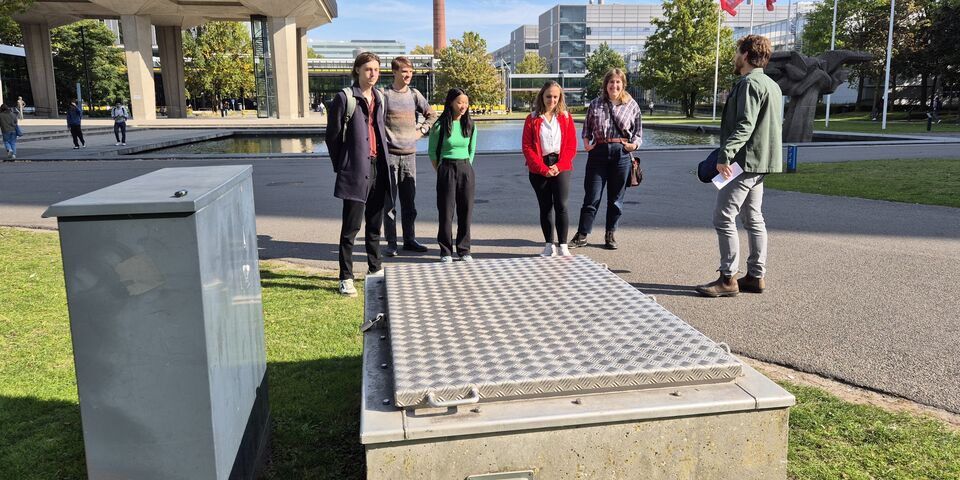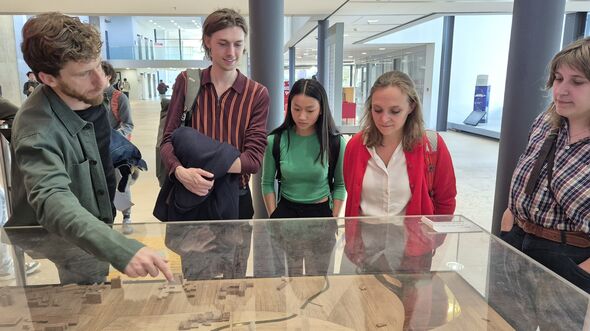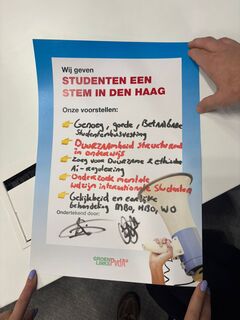GroenLinks-PvdA visits campus: what concerns students?
To encourage dialogue between students and politicians, members of the GroenLinks-PvdA political party paid an informal working visit to the TU/e campus. They were given a tour by GO Green Office and spoke with members of the student parties Groep-één and DAS. The first topics on the table were student housing, sustainability, and AI.
“Does the Executive Board listen to you?” Sep Wittenbols asks the students, as he and other GroenLinks-PvdA members are guided around the campus. Erwin Kerkhof, who coordinates the students active in GO Green Office, has taken them along for a walk. Proudly, he points out one of the 32 sources of TU/e’s thermal energy storage system (see main photo). By heating and cooling buildings with stored water, the university no longer relies on natural gas.
Kerkhof then quickly highlights several features that illustrate TU/e’s sustainability ambitions: signs of the WorkWalks, bird nesting boxes in the outer walls of Auditorium, and the unmown wildflower patches along the Dommel. The large new 3.4 MWh battery, which helps the university manage peak loads in the power grid and is also used for research, is located just too far away to visit. You’ll find it behind the Haven student complex.
Powerless
In Matrix, the group of four GroenLinks members and three GO Green Office staff receives a short tour of the building before meeting with the students who want to join the discussion. They include three members of DAS, a student representing Groep-één, a student board member from cultural umbrella association Scala, and a student from Summa College.
DAS raises questions about student housing. TU/e alumnus Jade van der Linden responds. She is number 21 on the GroenLinks-PvdA candidate list for the upcoming House of Representatives elections on October 29. “We believe the government should play a bigger role in addressing the housing problem. More government oversight and less market forces. And we need fairer rents.” Wittenbols, who serves as a councilor in the municipality of Eindhoven, mentions the Huurteam (the Rental Team) Eindhoven, where students can also turn for support. “That may be true, but as a student you still feel powerless against landlords who refuse to help you,” several students reply.
AI
DAS also wants politicians to take a stronger stance on the use of AI. “Many people don’t realize how much energy it consumes, how it infringes on privacy, and what the ethical concerns are.” The politicians admit they are not at the forefront when it comes to AI regulation and say they hope the European Commission will take the lead.
Groep-één draws attention to student well-being. “There is loneliness and stress, especially among international students.” As the discussion unfolds, GroenLinks-PvdA realizes that international students are often not included in surveys on student well-being. That seems to be an eye-opener.
At the end of the afternoon, GroenLinks-PvdA writes down five proposals they drafted together with the students. At the top: sufficient, good, and affordable student housing. Second: integrating sustainability structurally into education. Third: ensuring sustainable and ethical AI regulation. Fourth: researching the mental well-being of international students. And finally: equality and fair treatment across MBO, HBO, and WO. GroenLinks-PvdA intends to pursue these proposals in The Hague.
Despite inquiries from Cursor, it remains unclear whether other national political parties also plan to visit the TU/e campus during the election campaign
This article was translated using AI-assisted tools and reviewed by an editor.




Discussion